
Background information
Interview: founder of Swiss game publisher Stray Fawn talks preconceptions and the indie likeability factor
by Philipp Rüegg

"Nimbatus - The Space Drone Constructor is a promising new work from a Swiss studio. How much work, sweat and time does it take to create a game, from the first spark to the finished product? That's the question I put to the developers I met.
"The prototype took me a weekend and the game was supposed to be finished after a year."Micha Stettler, video game developer, was quite confident when "Nimbatus" was born. Six years later, the game has just entered its early access phase. Quite a normal delay, as I was able to ascertain after a quick trip to Stray Fawn, the studio that created this space drone simulator.
Six years ago, the game didn't have a name, it looked completely different, and the Stray Fawn studio wasn't even at the idea stage. Micha, its founder and now chief programmer, was working as a computer scientist at Leica Geosystems at the time. He spent his weekends developing new game prototypes. One of them was set in environments that could be destroyed. Micha worked on it for several weekends in a row. "I was really enjoying making it, and I soon realised that I wanted to turn it into a real game." That's when the then unnamed game began to take shape. "Micha's speciality was, and still is, programming. He quickly realised that he was going to need help.
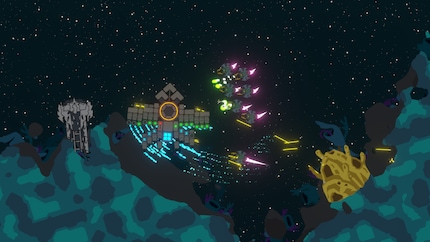
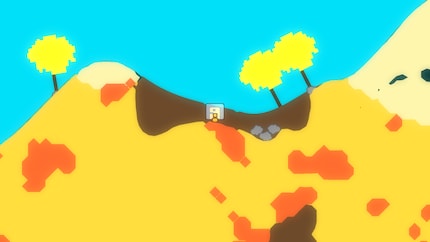
It was Philomena Schwab who was to provide that help. He met this former student of the Zurich University of the Arts three years ago, at a developer conference in Switzerland where he was presenting his game. Philomena was looking for a programmer for her own game, "Niche - a genetics survival game". They agreed that Philomena would take charge of Micha's marketing, while Micha would do the programming for him. "We complement each other perfectly. I feel more comfortable in front of my PC coding, and Philomena takes care of the conferences."
That's how Stray Fawn was born..
Following the merger, the studio initially focused on 'Niche'. The Kickstarter campaign was about to be launched. For Micha, the time had come to make a decision. Developing games had become much more than just a hobby, and it was no longer possible for him to reconcile this activity with his full-time job as a computer scientist. With part-time work out of the question, Micha decided to resign. Finding another job in IT was not going to be a problem. He was still able to continue working as a freelancer for a while until his successor was properly trained. This enabled him to acquire the start-up capital for the studio. "In the early days, I spent all my evenings and weekends programming to keep my head above water" It would be this passion that distinguishes games programmers from mainstream computer scientists. "The games industry is not lucrative for computer scientists. It's also the reason why traditional job offers have trouble attracting the right candidates. Micha and Philomena are looking for other collaborators for their growing studio at conferences, festivals, etc.
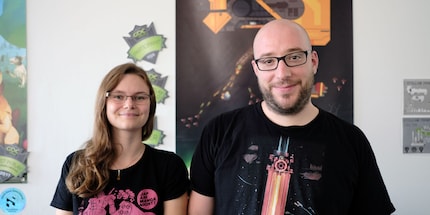
Roger Winzeler was the first to join the team. As a graphic designer, he was perfectly suited to the young studio. Then came Markus Rosse, game designer. "Roger and Markus were with us when we were only making 10 francs an hour. That wasn't enough to live on," explains Micha. In the beginning, he paid his employees' salaries out of his own pocket. Both of them came to work at Stray Fawn knowing what they were doing.
Arno Justus was the first programmer to be recruited. He was spotted by Micha and Philomena at the Zurich University of the Arts. "We looked at the theses that the students were preparing and spoke to the professors to determine the profiles that might interest us."
The Stray Fawn studio is a five-minute walk from the art school, right in the heart of Zurich West.
"In the beginning, you have to give up on making money," says Micha. There are undoubtedly more methodical studios than Stray Fawn who start with a mobile game and try to figure out how to make as much money as possible. "I'm not in this business for the money, but because I've loved video games since I was a kid. You can feel that passion in our games," explains the 32-year-old. It's clear that these are not just empty words.
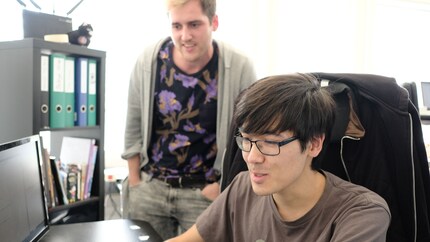
According to Micha, most video game developers start out solo. "But even if you know how to do everything, it's impossible to finish everything alone." And to add to the pressure, he also had to deal with the anticipation of people waiting for the game to be released. By setting up his studio, he was able to delegate to other people. "If I'd had to finish everything on my own, I'd never have survived," laughs Micha. "Imagine working on a project on your own for six years, and all of a sudden you get bad feedback? The other members of the team can better assimilate and mitigate the feedback. For 'Niche', it was just the opposite. "Philomena was always in a bad mood after reading something negative," laughs Micha. "We, on the other hand, can interpret it for her."
"Working in a network and exchanging with others is absolutely essential," Micha explains to me, talking about the transition from solo project to team project. "As a computer scientist, you know architecture, but you don't really know how to make fun games. I know how to create a board game, mill, paint or whatever. But what's going to make this game fun to play? That's where the game design studies come in. "Markus helps us to be more methodical," Micha is convinced that working in a team can only be beneficial. After three years working alone, you lose your objectivity. "You think that maybe what you're doing isn't of interest to anyone. Having other people involved can be extremely useful. They bring new ideas and make the game more beautiful", says Micha. He used to design everything himself. But on the other hand, it can't have been easy to see someone land on his project after three years.
"Stray Fawn" means wandering fawn. A name with meaning. "95% of video games don't make any money. We're a fragile little creature that could quickly become a victim," explains Micha. But wandering also means relying on yourself to survive. Stray Fawn has no investors and takes no orders. Income comes exclusively from their games. The studio has 11 employees, most of them part-time. Six of them are currently working on 'Nimbatus', the rest on 'Retimed', a multiplayer game. The sound engineer is working on both projects.
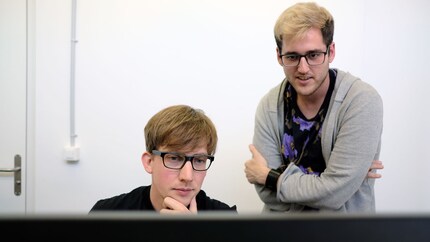
"Thanks to the "Niche" income we manage to keep our heads above water." But it's not enough to cover all the expenses. They can also draw on proceeds from the Kickstarter campaign for "Nimbatus" and CHF 50,000 from Pro Helvetia. The launch on Steam enabled the team to earn 200,000 francs from the 20,000 copies sold in just a few weeks. "To date, it's our best release," the game's dad tells us.
While Stray Fawn can't bring in investors or accept lucrative commissions, the studio still manages to pay its employees relatively well, for the industry. "We all earn the same salary, 5,000 francs for a full-time job". The employees also share a bonus that Micha and Philomena negotiate together. If a game is a hit, everyone benefits equally.
The system has its advantages and disadvantages. On the one hand, it's transparent and fair because everyone receives the same salary, regardless of their hierarchical rank. On the other hand, recruitment can be complicated when working with such a system. "If a new employee asks for a higher salary, I'll have to give everyone a raise," explains Micha. That's why, when hiring, they prefer to make sure they find the right person, even if it's not the best on paper.
The gameplay principle of "Nimbatus" has remained the same for six years. You control a drone that you assemble from countless individual parts. You then give free rein to your creativity as you travel through a galaxy, which you can destroy at will using the machine you've created. "On the other hand, the whole environment of the game has changed," Micha explains, in a fluid and iterative way. But it wasn't the best of variants; there was still a lot to refine. The Kickstarter campaign brought it all to fruition.
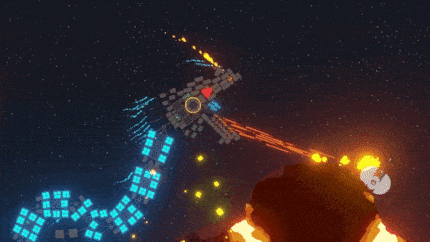
Now that Micha is no longer working alone on the game, other structures have been able to be introduced. "We get together every morning to discuss what we're working on and what new tasks lie ahead. The key elements of 'Nimbatus' are available, despite the early access status, and the game is playing very well. As a result, the team isn't busy looking for bugs or providing core features, they're focused on producing content. "It's hard to make big changes because players are used to a certain system." They learned this lesson with "Niche", whose changes weren't always well received. "Even if it's in early access, the game has to be consistent and easy to play without actually being finished. You have to find that balance," explains Micha. One of the advantages of "Nimbatus" is that you can play ad infinitum. That's exactly what we're looking for in early access games. It allows players to stay connected to the project.
Although "Nimbatus" takes up a lot of their time, every month the team members take two or three days off to work on new projects. This allows them to lay the foundations for future games. And there's no shortage of ideas. But in any case, that's not the problem: "Anyone who knows anything about video games is bound to have an idea one day or another."Managing to create something that people will enjoy, that's not given to everyone.
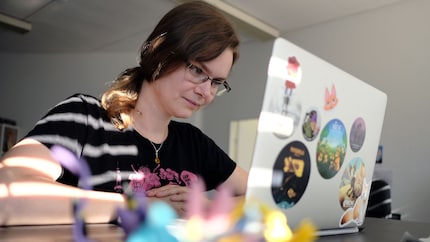
"Our industry is extremely competitive. A good marketing strategy is essential if you want to stand out from the crowd," explains Micha, looking at Philomena Schwab. This is precisely the 29-year-old's mission. "Niche" enabled them to make a few contacts with Valve. Philomena used these contacts and quickly photoshopped "Nimbatus" onto the Steam home pop-up that gives information about new releases. "She sent the result to Valve to show them that it would look really good," Micha recalls with a smile. But Valve replied that it was just a matter of course, and that early access titles were never part of the pop-up anyway. Five hours after the launch of 'Nimbatus' on Steam, the team received an email from Valve. The game had sold so well, they finally wanted to put "Nimbatus" in the spotlight.
"We all participated using every possible advertising channel. "In all, 90,000 newsletters were sent out and 50,000 Steam users received a notification thanks to the wish list system. Most of the newsletters were sent to people who contributed to the Kickstarter. "Kickstarter allowed us to communicate the release of the game to as many people as possible and to build up a fanbase," he says. Revenues took a back seat. Today, the team plans to hire someone to manage marketing in China. But until then, Philomena holds the reins.
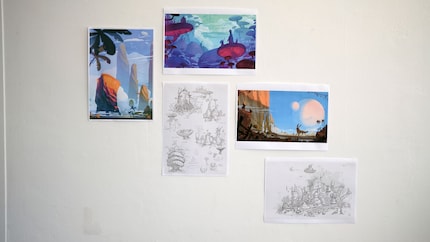
At the time of my visit, Philomena was working on a tool to evaluate YouTube videos, who streamed what, how the streaming went, etc. For Stray Fawn, collaboration with streamers is extremely important. According to Philomena, the number of subscribers is not the main criterion. "Small streamers with a few thousand subscribers are often more useful to us than YouTube's PewDiePie, because their target group is closer to ours." In addition to YouTube and Twitch, Steam is also an interesting streaming platform. Those who say that Steam is just a shop probably don't know much about the world of live video. Steam has been streaming games for a long time now. "On important days, like Saturdays and Sundays, we stream," explains Philomena. "If we count enough viewers, Steam puts us on the home page. That's extremely useful for us."
Forming a specially priced bundle with another similar game can also be relevant in terms of advertising. "Besiege", a game where you build medieval catapults instead of drones, could work well with "Nimbatus". However, these actions need to be put in place by Valve.
Articles in mainstream media or news portals are of little use to game studios that are in the midst of a boom. "If it's going to happen, it's best done on a special page. For Niche, we did very well. I'd have to give it another go." Philomena has several success stories to her name thanks to posts on Reddit or 9gag. "The last time one of my posts ended up trending, I found myself replying to comments until 5am."
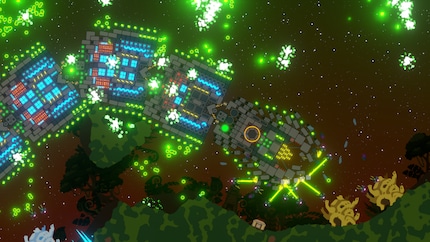
Discord is also an interesting tool. This chat software has become one of the main social platforms for gamers. Stray Fawn maintains contact with his fans there. Despite all these marketing measures, Micha is convinced that a great game can also work without marketing. "Word of mouth can be of key importance."
After more than six years, this little project that took up one person's weekends has turned into a full-fledged game with six people working on it, and has managed to make it onto the Steam homepage. But while it may not be obvious, there's often a lot more work behind a game than you might think. Games created by a single person, such as 'Papers, Please' or 'Stardew Valley', are even more impressive. The Stray Fawn team was lucky enough to avoid this stress. There aren't too many six of them to get everything done, but you can see from their faces that they love their work. It will be interesting to see how "Nimbatus" develops and look out for the Zurich studio's next title.
"Nimbatus" is available in early access on Steam or via Humble Bundle.
Being the game and gadget geek that I am, working at digitec and Galaxus makes me feel like a kid in a candy shop – but it does take its toll on my wallet. I enjoy tinkering with my PC in Tim Taylor fashion and talking about games on my podcast http://www.onemorelevel.ch. To satisfy my need for speed, I get on my full suspension mountain bike and set out to find some nice trails. My thirst for culture is quenched by deep conversations over a couple of cold ones at the mostly frustrating games of FC Winterthur.